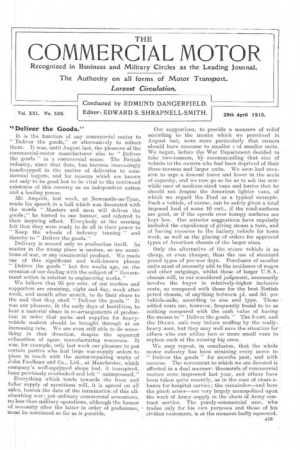"Deliver the Goods."
Page 1

If you've noticed an error in this article please click here to report it so we can fix it.
It is the function of any commercial motor to " Deliver the goods," or alternatively to collect them. It was, until August. last, the pleasure of the commercial-motor manufacturer also to " Deliver the goods " in a commercial sense. The British industry, since that date, has become increasingly handicapped in the matter of deliveries to commercial buyers, and for reasons which are known not only to be good but to be vital to the continued existence of this country as an independent nation and a leading power.
Mr. Asquith, last week, at Neweastle-on-Tyne, made his speech in a hall which was decorated with the words " Masters and men will deliver the goods;" he turned to one banner, and referred to their inspiring effect. Everybody at the meeting felt that they were ready to do all in their power to 'Keep the wheels of industry turning " and thereby to" Deliver the goods."
Delivery is second only to production itself. As matter in the wrong place is. useless, so are munitions of war, or any commercial product. We. made use of this significant and well-known phrase " Deliver the goods " but five weeks ago, on the occasion of our dealing with the subject of" Government action in relation to engineering works."
We believe that 95 per cent. of our readers and supporterS are straining, night and day, week after week, and month after month, to do their share to the end that they shall " Deliver the goads." It was our pleasure, m the early days of hostilities, to bear a material share in re-arrangements of production in order that parts and supplies for heavyvehicle makers should be brought through at an increasing rate. We are even still able to do something in that direction, despite the apparent exhaustion of spare manufacturing resources. It was, for example, only last week our pleasure to put certain parties who had large war-suPply ordersto place in touch with the motor-repairing works of John Faulkner and Co., Ltd., at Manchester, which company's well-equipped shops had, it transpired, been previously overlooked and left" unimpressed." Everything which tends towards the freer, and fuller supply of munitions will, it is agreed on all sides, hasten the date of the termination of this allabsorbing war; yet ordinary commercial avocations, no less than military operations, although the former of necessity after the latter in order of preference, must be continued so far as is possible. Our suggestions, to provide a measure of relief according to the means which we perceived in August last, were more particularly that owners should have recourse to smaller a 'id smaller units. We began, hefors. the War Department decided to take two-tonners, Izry recommending that size of vehicle to the owners who had been deprived of their three-tonners and larger units. We soon had occasion to urge a descent lower and lower in the scale of capacity, and we now go so far as to ask the erstwhile user of medium-sized vans and lorries that he should not despise the American lighter vans, of which we regard the Ford as a typical example. Such a vehicle, of course, can be safely given a total imposed load of some 10 cwt., if the road-surfaces are good, or if the speeds over bumpy surfaces are kept low. Our anterior suggestions have regularly included the expediency of giving steam a turn, and of having recourse to the battery vehicle for town work, as Well as the placing of orders for approved types of American chassis of the larger sizes.
Only the alternative of the steam vehicle is as cheap, or even cheaper, than the use of standard petrol types of pre-war days. Purchases of smaller units must of necessity add to the incidence of wages and other outgoings, whilst those of larger U.S.A. chassis will, in our considered judgment, necessarily involve the buyer in relatively-higher inclusive costs, as compared with those for the best British petrol chassis, of anything between id. and 3d. per vehicle-mile, according to size and type. Those added costs are, however, frequently found to be as nothing compared with the cash value of having the means to" Deliver the goods." The 5-cwt. and the 10-cwt. unit may induce scoffing by the reallyheavy user, but they may well save the. situation for others who can utilize two or more small vans to replace each of the missing big ones.
We may repeat, in conclusion, . that the whole motor industryhas been straining every, nerve to " Deliver the goods " for Months past, and with success. The movement to which we are devoted is affected in a dual manner: thousands of commercial motors were impressed last year, and others have been taken quite recently, as in the case of ehars-abanes for hospital service; the remainder—and here the pinch arises—are very largely monopolized upon the work of Army supply in the chain of Army contract service. The purely-commercial user, who trades only for his own purposes and those of his civilian customers, is at the moment badly squeezed. A15






















